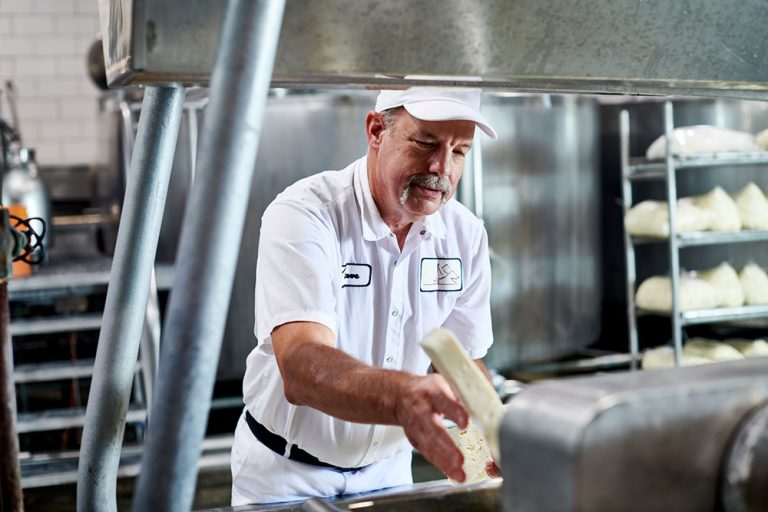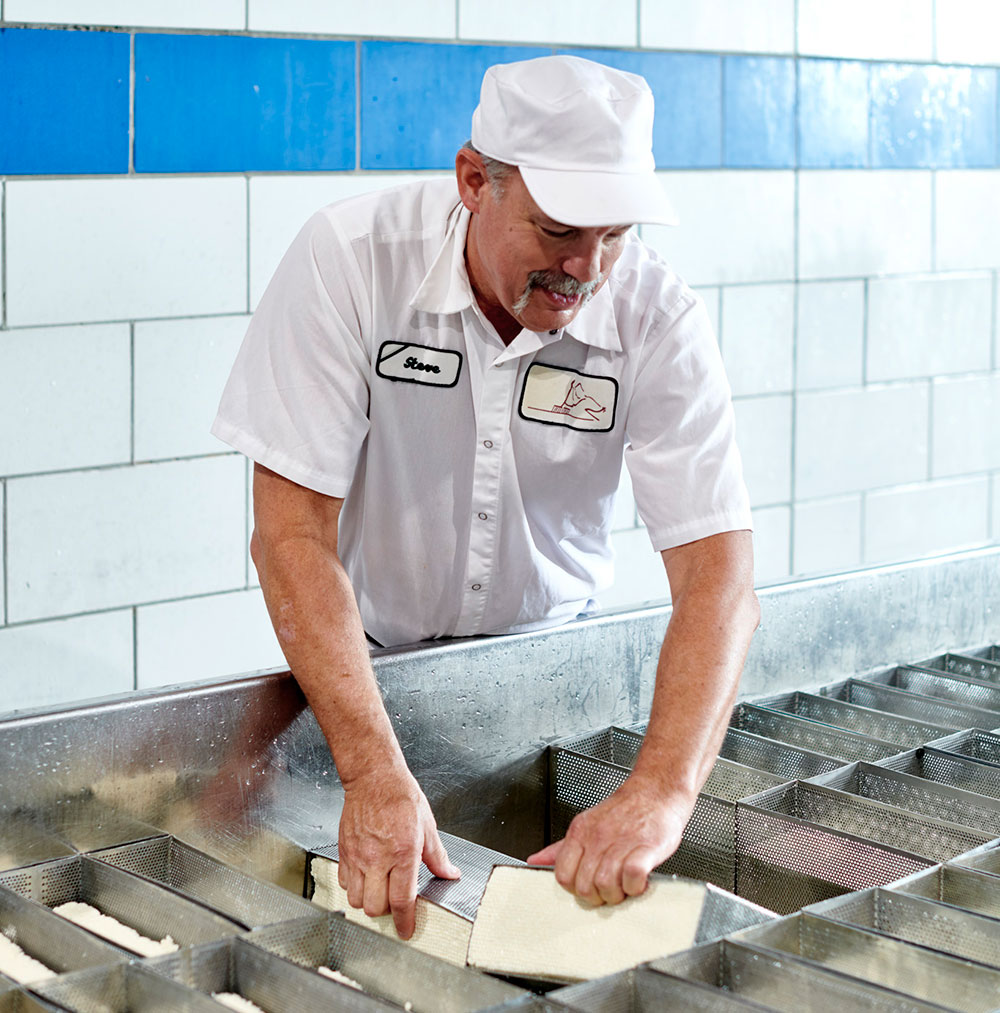Living the Dream: I’m a Master Cheesemaker
What’s it like to be a Wisconsin Master Cheesemaker? We asked him.

Welcome to Living the Dream, a Livability.com series about people who made their big dreams a reality – and the places and communities that made it possible. Do you know someone who’s carved out a unique lifestyle or business in a small town or small to mid-sized city? We’re always looking for great stories. Email our editor for a chance to be featured!
Name: Steve Stettler
Age: 64
Occupation: Co-owner and Master Cheesemaker at Decatur Dairy
Location: Brodhead, WI
You’re a third-generation cheesemaker. How did you get started in the family business?
I went to college and I was taking general courses. I was looking at something in the medical field or maybe another avenue in the dairy industry. Then my dad asked me to come back to the dairy and offered me the chance to buy in. I thought, if I can buy into a business at a young age, then why not do it? So that’s what I did.
Have you ever thought about doing something else?
No, the cheesemaking business has been pretty good to me. It’s a creative business. There’s always something to do and there’s always something new to learn.
How is cheesemaking creative?
There are so many different cultures out there, so you can make the same cheese, but also change the flavor a little bit. You can custom-make cultures and make the same product as another individual, but it has a different flavor to it. I make a cheddar that’s not a traditional cheddar, but at the end of the day, it meets the criteria and specifications of cheddar and it has a cheddar flavor. A lot of the products we make here with our own formulas and sell from our store, which is a little different than what other cheesemakers might be doing. It’s not large volumes, but it’s just a mix of a lot of cheeses. This is what makes you be on the top of your game.

You have to be licensed to be a cheesemaker in Wisconsin, but you don’t have to be a Master Cheesemaker. What made you pursue so many Master certifications?
The Master Cheesemaker is more about your personal ambition to be the best you can be in your field. So you put yourself out there, number one to go to their courses, advance your education, get to meet people. And then at the same time, you have to make a quality product. There’s a lot of pride involved and then you have to take the personal time to do it. When you get into the Master program, you meet so many different people with different ideas that you may have not thought about.
What cheeses do you have Master Cheesemaker Certification in?
Havarti, Muenster, farmer cheese, specialty Swiss, brick cheese, cheddar and curds.
Why did you want cheese curds to have their own classification in the Master Cheesemaker program?
Cheese curds, in my mind, have always been a product that should be a master cheese. I asked about it years ago and there was this theory that curds are part of cheddar. So if you have a Master certification in cheddar, your cheddar curds can have the Master Mark. In my opinion, a cheese curd is a different animal than cheddar or Muenster or whatever you’re going to make your curds out of. There are good curds and then there are curds that are just marginal. I was fortunate enough to be the first person certified as a Master Cheesemaker of cheese curds.
How many varieties of cheese curds do you make?
We make 14 flavors of curds: cheddar, BBQ mesquite, buffalo, French onion, horseradish bacon, hot salsa, jalapeno white, mixed, Muenster, tomato bacon basil, white bleu cheese, white garlic and herb, white green olive and white ranch.
What would surprise people about cheesemaking?
It all comes down to milk from the farm, the cultures that go into the cheese and then how you age it afterwards. Cheesemaking is all about times and temperature, but with computers, you can set your vats to stir the same, heat the same, so the variables are the milk, culture and the many different varieties of aging. You can put a smear on it. Let it shelf cure. Put a hard rind on it. There are just so many different things now that people are doing to make a small difference that can keep the cheese buyer pretty entertained for a while.
What’s your favorite part of cheesemaking?
The best thing about the whole deal is if someone says, “Thank you for what you do” and “Keep on doing what you’re doing” and “We’re really glad we’ve found your products.” They pat you on the back and that’s what makes it all worth it. You know you’re doing something right.
What is your favorite cheese?
It depends on the day. I probably eat 10 to 12 different pieces of cheese in a week, but I have the luxury of pulling one or another out of the case and sampling it. Growing up, my uncle made an aged cheddar that I always liked and I still today like an aged cheddar. There are just so many creative people out there. There are so many different varieties of things in Wisconsin that are so good; it’s just really hard to choose. How do you beat a creamy blue cheese? If I was buying cheese, it would probably be a Havarti-type or Swiss-type or a Cheddar-type. I usually have a little bit of all of them in the refrigerator. A good aged brick cheese. Smear cheeses have advanced so much in the last 10 years. There are just so many different varieties of all of them that a person that is kind of a cheese snob should always find something to interest their taste buds.


